Mammillaria senilis is a species of cacti in the subtribe Cactinae. It is native to Mexico. The cactus grows in groups, and grow up to 8 inches tall. They form large red flowers that range from 5.5 to 6 centimeters in diameter.
Mammillaria senilis Care
Mammillaria senilis



Mammillaria senilis is a spiky, snowball of a cactus. This clustering species has distinctive, long white spines, some with hooked tips. Each globose stem can grow to 6.0" tall and 4.0" wide. With time they produce clusters of offsets. This cactus is native to Mexico and blooms with orange-red flowers perched on tall, narrow floral tubes.
How to Care for the Plant

Water

Water regularly in summer, but do not overwater (very wet-sensitively, especially in light of its small root system) Water thoroughly only if soil is dry to the touch, let soil dry in between to prevent root rot, keep very dry in winter.

Fertilizer

Feed with a high potassium fertilizer in summer. Suspend feeding during the dormant winter period.

Sunlight

High levels of light are needed to flower and for good spine development. It can be sunburned if moved from shade/greenhouse into full sun too quickly. During the spring it may be able to take full sun until the heat arrives at the end of spring. In an area that has hot afternoon sun, it may be able to take full morning sun, but requires afternoon shade or afternoon light shade.

Soil

Use a very porous acidic potting media with excellent drainage, as can be achieved by the addition of extra perlite or pumice.

Temperature

It is a mountain plant that prefers somewhat cooler temperatures and it proved to be quite frost resistant if kept dry and hardy as low as -5°C. Minimum average temperatures should be around 50°F (10°C).

Container

If growing inside, choose any type of container with enough drainage holes.

Popularity

17 people already have this plant 4 people have added this plant to their wishlists
Discover more plants with the list below
Popular articles






